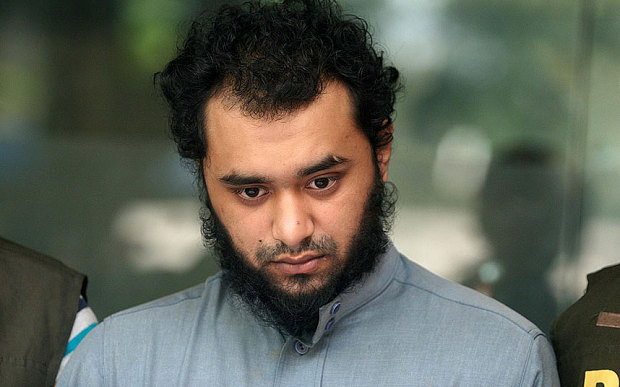
Spreading Tentacles: The Islamic State in Bangladesh
Publication: Terrorism Monitor Volume: 13 Issue: 3
By:

Growing evidence suggests that the influence of the Islamic State organization has reached the South Asian, Muslim-majority country of Bangladesh. The country has long been home to small, but significant, numbers of radicals from both local militant groups, such as the Jama’at ul-Mujahideen Bangladesh (JMB), the country’s most significant local jihadist group, and those linked to transnational jihadist formations, such as al-Qaeda. However, the Islamic State’s self-proclaimed caliphate and the promise of it’s leader, Abu Bakr al-Baghdadi, to return to all Muslims their “dignity, might, rights and leadership” seem to have infused a renewed Islamist fervor within a section of Bangladeshi youths and among existing radical elements. [1]
Arrests Expose Militant Links
One of the clearest indications of this development came in late September 2014 when the government’s arrest of a British citizen of Bangladeshi origin, Samiun Rahman (a.k.a. Ibn Hamdan), who lived in the capital Dhaka’s Kamalapur area, unearthed an apparent Islamic State recruitment drive in the country (Daily Star [Dhaka], September 30, 2014). Investigations subsequently revealed that Samiun, a former London taxi controller who had spent time in British prisons, had travelled to Morocco, Mauritania and Syria, before entering Bangladesh in early 2014 to recruit jihadists from Bangladesh and neighboring Myanmar (Daily Telegraph, September 29, 2014). Intriguingly, Samiun reportedly confessed to recruiting Bangladeshis on behalf of both the Islamic State and al-Qaeda’s Syrian affiliate Jabhat al-Nusra, competing transnational jihadist groups. Two of his contacts – Asif Adnan and Fazle Elahi Tanzil – were also detained, although they were subsequently released on bail (Daily Star [Dhaka], December 24, 2014; December 30, 2014). Both are reportedly members of the newly-founded Ansarullah Bangla Team (ABT), an al-Qaeda linked militant group, although it is not clear which Syria-based jihadist group they were linked to, if any (Bdnews24, September 25, 2014).
Further evidence of the Islamic State’s growing links and ambitions in Bangladesh came on January 19, when police detained Sakhawatul Kabir, a veteran militant leader who had long been associated with al-Qaeda members in Pakistan and with the JNB, along with three other individuals (Daily Star [Dhaka], January 19). According to Shaykh Nazmul Alam, a deputy police commissioner with Dhaka’s detective and criminal intelligence division, the arrested individuals intended to recruit other individuals to the Islamic State and were also allegedly planning major terrorist strikes in the country at the behest of the Islamic State (Risingbd.com, January 19). Kabir, who had a background in information technology, was subsequently identified as the regional commander of the Islamic State’s operations in Bangladesh, while his associate Anwar Hossain has been identified as the group’s local financier (Daily StarI [Dhaka], January 19).
Other police operations have led to arrests linked to the Islamic State’s online and social media operations. For instance, in late September 2014, the Dhaka Metropolitan Police arrested Hifzur Rahman, a student member of the JMB (New Age [Dhaka], September 26, 2014). Hifzur, however, additionally claimed to be the Islamic State’s Dhaka unit leader and was reported to have been involved in spreading propaganda and carrying out promotional activities for the group using a Facebook page titled “ISIS Bangladesh” (Dhaka Tribune, September 27, 2014). Reports suggest that he was attempting to recruit foot soldiers for the Islamic State across the country, especially in the Sylhet and Habiaganj areas, which are located in the northeastern part of the country (New Age [Dhaka], September 26, 2014). Additional developments in the social media sphere included the release of an August 2014 video showing various individuals pledging their support to the Islamic State and al-Baghdadi in Bengali and Arabic, further underlining apparent Islamic State influence among some Bangladeshis (Dhaka Tribune, August 2, 2014). [2] There have also been reports in some Bengali-language Indian newspapers that 360 Islamic State-linked militants have entered Bangladesh, however this cannot be corroborated and seems unlikely (Anandabazar Patrika [Kolkota], January 21). There are no reliable figures publicly available on how many Bangladeshis are active with the Islamic State in Iraq and Syria.
British Links
Bangladesh has a particular vulnerability to Islamic State radicalization because of large overseas Bangladeshi population and particularly the Bangladeshi diaspora in the United Kingdom, where some Muslim communities have proven significantly receptive to the lure of the Islamic State and other extremist groups, as illustrated by the above arrest of British citizen Samiun Rahman. For instance, a purported June 2014 Islamic State recruitment video titled “No Life without Jihad” announced that several British nationals of Bangladeshi origin had joined the Islamic State. [3] The video featured Abd al-Raqib Amin (a.k.a. “Abu Bara al-Hindi”), a British citizen born in Bangladesh, but raised in Aberdeen, Scotland. The video was released by the Islamic State affiliated al-Hayat Media Center and urged Muslims in Western countries to join the ongoing jihad in Syria and Iraq (BBC News, June 23, 2014). Amin was seen in the video urging young Muslims to join the group stating, that “Living in the West… you feel depressed,” and adding that “the cure for the depression is jihad” (al-Arabiya, June 29, 2014). In addition, in October 2013, at least five young men of Bangladeshi origin, acting as part of a group known as “Britani Brigade Bangladeshi Bad Boys,” left the UK city of Portsmouth to join the Islamic State in Syria (New Statesman, November 6, 2013). A year later, four of them were reported to have been killed while fighting against Syrian government forces (Guardian, October 26, 2014). Such radicalized British-Bangladeshis have the potential to amplify the Islamic State threat in Bangladesh, due to their ability to travel abroad with greater ease than many Bangladeshis, to potentially access greater sources of funding and to connect with extremists based elsewhere, including in Europe and the United States.
Outlook
The involvement of transnational jihadist groups with Bangladesh is not new. Groups like al- Qaeda have enjoyed support among radical and militant communities in Bangladesh since at least the late 1990s when JMB leaders officially endorsed Osama bin Laden’s fatwa against the United States. However, such militant groups have previously gained very limited traction in Bangladesh and have carried out very few successful attacks for a number of reasons, including the country’s entrenched secular traditions, its effective security service, a widespread popular suspicion of imported forms of Islamism (particularly those connected to Pakistan) and generally limited levels of public support for even “democratic” or “moderate” Islamist groups like Jamaat-e-Islami. That said, the growing influence of the Islamic State in Bangladesh potentially signals more trouble ahead, particularly given that the country is yet to formally proscribe the group, which would help its security agencies to control the fundraising and recruitment activities of the organization. The apparent rise in Islamic State-related activism also comes as both Bangladesh’s leaders and its security services are partly distracted by the country’s ongoing political crisis, which has led to significant unrest in recent months. Even though there are no clear estimates of how many Bangladeshis might have travelled to Syria or Iraq to partake in the ongoing conflicts there, or the exact number of Islamic State sympathizers already inside country, the recent arrests and developments on social media suggest that there is clear potential for this trend to grow in due course.
Animesh Roul is the Executive Director of Research at the New Delhi-based Society for the Study of Peace and Conflict (SSPC).
Notes
1. Quotation taken from the following translation: Full Text of “A Message to the Mujahideen and the Muslim Ummah: In the Month of Ramadan,” Gatestone Foundation, July 1, 2014, https://www.gatestoneinstitute.org/documents/baghdadi-caliph.pdf.
2. The video was uploaded to YouTube on August 2, 2014, with the English-language title, “Muslims in Bangladesh Give Bayah to the Caliphah Ibrahim (Hafiahulla).” The video has since been removed.
3. The video was released on YouTube in June 2014 and has since been removed.





